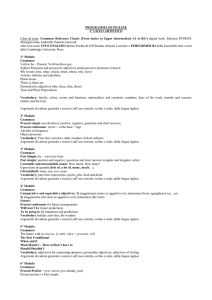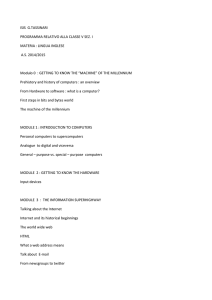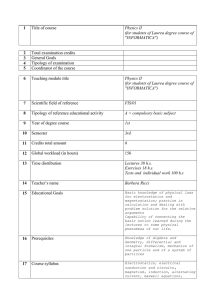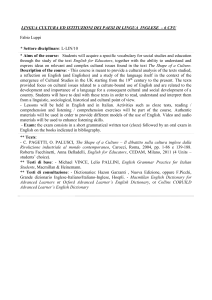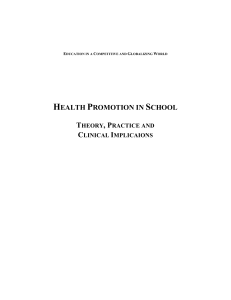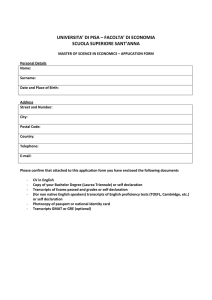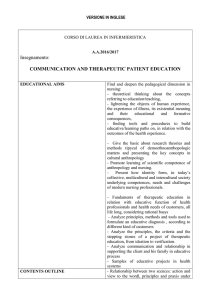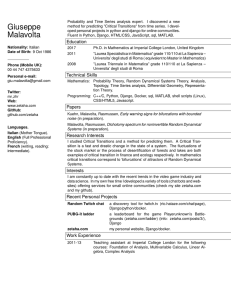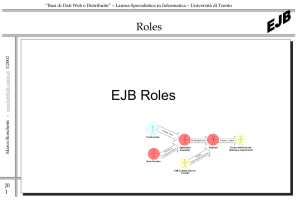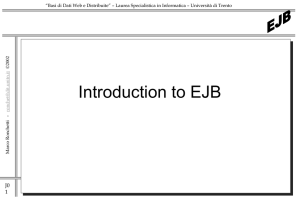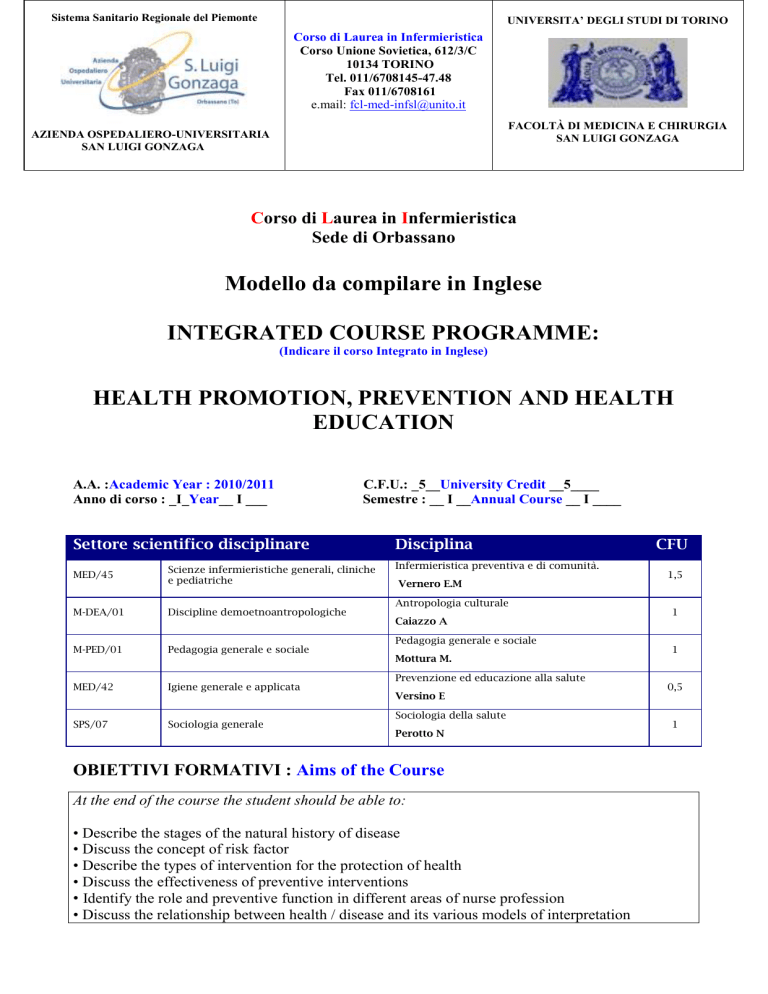
Sistema Sanitario Regionale del Piemonte
UNIVERSITA’ DEGLI STUDI DI TORINO
Corso di Laurea in Infermieristica
Corso Unione Sovietica, 612/3/C
10134 TORINO
Tel. 011/6708145-47.48
Fax 011/6708161
e.mail: [email protected]
FACOLTÀ DI MEDICINA E CHIRURGIA
SAN LUIGI GONZAGA
AZIENDA OSPEDALIERO-UNIVERSITARIA
SAN LUIGI GONZAGA
Corso di Laurea in Infermieristica
Sede di Orbassano
Modello da compilare in Inglese
INTEGRATED COURSE PROGRAMME:
(Indicare il corso Integrato in Inglese)
HEALTH PROMOTION, PREVENTION AND HEALTH
EDUCATION
A.A. :Academic Year : 2010/2011
Anno di corso : _I_Year__ I ___
C.F.U.: _5__University Credit __5____
Semestre : __ I __Annual Course __ I ____
Settore scientifico disciplinare
MED/45
Scienze infermieristiche generali, cliniche
e pediatriche
M-DEA/01
Discipline demoetnoantropologiche
M-PED/01
Pedagogia generale e sociale
MED/42
Igiene generale e applicata
SPS/07
Sociologia generale
Disciplina
Infermieristica preventiva e di comunità.
Vernero E.M
Antropologia culturale
Caiazzo A
Pedagogia generale e sociale
Mottura M.
Prevenzione ed educazione alla salute
Versino E
Sociologia della salute
Perotto N
OBIETTIVI FORMATIVI : Aims of the Course
At the end of the course the student should be able to:
• Describe the stages of the natural history of disease
• Discuss the concept of risk factor
• Describe the types of intervention for the protection of health
• Discuss the effectiveness of preventive interventions
• Identify the role and preventive function in different areas of nurse profession
• Discuss the relationship between health / disease and its various models of interpretation
CFU
1,5
1
1
0,5
1
• Recognize the uniqueness and diversity of every healthy person and / or sick
• Discuss the relationships between society and disease
• Discuss the components of the ‘taking care’ relationship
• Project an educational plan
•Discuss the conccepts of learning, motivation to learn and the role of the nurse in enhancing the
motivation of clients
• Be aware of the importance of quality of customer relationships in the work of the nurse education
• Reflect on their education and communication styles and their own ways of interacting with
customer.
The theme "PASSI" will act as integrator of the course.
The National Center for Epidemiology, Surveillance and Health Promotion (Cnesp) of the Institute
of Health (ISS), supported by regional experts and a 'committee of wise men' from different
institutions of the country, initiated the project 'PASSI' . The project is included in health policies
undertaken in Italy to promote prevention: today incorrect lifestyles represent a public health
priority that involves the increased risk of cardiovascular disease, cancer and diabetes.
COTENUTI : Contents
• Concept of health
• Primary prevention, secondary and tertiary prevention.
• Natural history of the disease.
• The theory of nursing work life: the concept of "person" and "environment" and "active life".
• Analysis of need and its different concepts.
• The needs of health education and analysis of needs and priorities in the field of preventive and
community nursing.
• Quality and communication processes.
• Empowerment and coping strategies.
• Importance of media in education and health to use and produce material for health education.
• Health education tools: interviews, questionnaires, observation and teamwork
•"Design in Health Education" means the methodological rigor as a quality assurance intervention
(identifying needs, setting objectives, formulation and program implementation, and evaluation tools).
• The contextualization rules: how the law promotes change by developing a new culture (WHO guidelines
and the Council of Europe, national legislation, regional and local level - ASL)
• Geberal aspects of antropology
• Analysis of the relation between nature / culture
• Cultural definitions of gender
• Processes of cultural transmission and reproduction
• Anthropological approaches to the body and illness
• The different models of interpretation of the relationship between health / disease
• The medical practices and social and cultural forms of suffering, symptom, illness
• Design and construction processes implemented by different companies with respect to some issues of
particular relevance to health care (hygiene, nutrition, hospitalization) and a few moments emblematic of
the life cycle (birth, rites of passage, death)
• Education, training, teaching, learning, change, formal and informal education
• Adult education and peer education
• The stages of the educational relationship
• Motivations for aid to the profession; burn out
• Health, illness and medicine: comparing three perspectives:
• The medical point of view.
• Culture, perceptions and representations of health and medicine.
• The traditional sociological approaches to the study of the factors of health and illness:
•Talcott Parsons.
•Goffman and phenomenological perspective.
• The relationship with the patient as trading.
•The health communication
• The effectiveness of health information.
•The requirement for an intercultural approach:
•The social representations of illness.
TIPOLOGIA DELLA VERIFICA DEL PROFITTO : Exam Evaluation
At the end of the course the examination will take place as follows:
written test consisting of multiple-choice quiz with only one correct answer.
TESTI DI RIFERIMENTO : Text Book
Books will be recommended at the beginning of the course
Firma Signature
( Signature on original copy)

